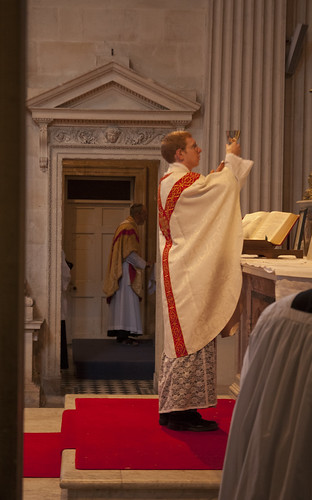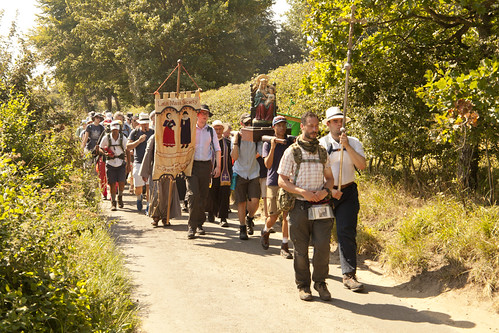Chairman's Blog
Feminists attack feminists over prostitution
My latest on LifeSiteNews.
To mark International Women’s Day, a feminist group called “Collective for the Abolition of Pornography & Prostitution” conducted a small demonstration in a famous Parisian square, the Place de la Republique. They were attacked, ironically, by a rival gang of feminists, who chanted abuse, pulled down their banners, tried to spray paint their eyes, and made death-threats.
The second group was pro-prostitution, a position which has achieved dominance in the feminism of much of the English-speaking world, but less so elsewhere. Intriguingly, they accused the anti-prostitution group as being “[t]rans-exclusionary”: that is, of not wanting to say that biological males who identify as women are really women. Trans issues were not part of the original protest at all, so this was a matter of the association of ideas on the part of the pro-prostitution group.
LMS Walsingham Pilgrimage: booking open, early bird discount: 26-30 Aug
November Sewing Retreat: Booking open
Further ahead, the booking page is open for business for the next Sewing Retreat after that: Spring 2022.
Private Masses in St Peter's: who's in the cross-hairs?
 |
| Private Masses before a 'First Mass' of a newly ordained priest (Fr William Barker FSSP) in Bavaria, in a church near Wigratzbad. |
 |
| Private Masses at an LMS Priest-Training Conference at Prior Park, Bath |
 |
| A private Mass at another LMS Priest Training Conference, at Belmont Abbey. |
New podcasts, with Roger Buck
The Latin Mass Society's Iota Unum Podcast series continues with two podcasts with the author Roger Buck. You can find them on Podbean, Spotify, and ITunes: search for the Latin Mass Society
Part 1: What is the New Age? (Podbean)
Part 2: Theosophy and the roots of the New Age (Podbean)
Roger Buck was born in California, was brought up partly there and partly in England, and has also lived in various places on the Continent. He is currently living in Ireland. He spent close to three years living at the New Age centre at Findhorn in Scotland, and nearly twenty years in the New Age milieu, before his conversion. Roger’s conversion story is described in his book Cor Jesu Sacratissimum, which defends the Latin Mass and details the tragedy of the post-Vatican II Church.
More about Roger Buck can be found here:
Roger’s website
Roger’s YouTube channel
Roger’s books:
The Gentle Traditionalist: A Catholic Fairy-Tale from Ireland (2015) (LMS Shop)
The Gentle Traditionalist Returns: A Catholic Knight’s Tale from Ireland (2019) (LMS Shop)
Cor Jesu Sacratissimum: From Secularism and the New Age to Christendom Renewed (2016) (LMS Shop)
Support the Latin Mass Society
The New Feminism tells women to accept abuse
Most people are blissfully unaware of the vast extent of intellectual fakery which inhabits universities around the world. The fact that a great deal of it is paid for by taxpayers is bad enough, but sometimes it rises to levels which raise a different kind of question. This is the case with this articleby Alison Phipps, Professor of Gender Studies at Sussex University. She shares this institution with the ‘Gender Critical’ feminist Kathleen Stock whom I wrote about here, but describesher colleague’s views, such as that women should not have share refuges with biological males, as beneath debate (“‘Reasonable debate’ cannot counter unreasonable ideas.”). In the article, Phipps writes that women expressing trauma about sexual violation, a phenomenon she describes as “white tears”, is a tool of oppression.
Phipps’ central idea is summed up in the title of her book: “Me Not You”. In the cover design these words are superimposed on the words “Me Too”. The idea is that when a woman complains about being raped, as happened with the “MeToo” movement, she is drawing attention to her own suffering, and therefore drawing attention away from the suffering of others. If she is relatively privileged, this is an act of oppression against those less privileged than her, who are thereby silenced.
It is a very strange argument. It is certainly true that when a more “privileged” person is the victim of abuse or injustice, he or she has an opportunity to fight back which other victims may lack. All kinds of resources, contacts, legal assistance and so on may be available to such a victim. Again, an abuser so bold as to tackle a Hollywood star, for example, will almost certainly have been abusing less well-connected victims. Is this a reason for the star to ignore the abuse and remain silent? Of course not. When the most well-resourced victims, the ones with least to fear, finally turned on Harvey Weinstein, they did what many other victims could not so easily do: they brought his abuse to an end.
As a matter of fact, even very humble victims of abuse can sometimes be successful. The gilded career of Dominique Strauss-Kahn, then head of the International Monetary Fund, was shipwrecked by a New York hotel maid. (The criminal prosecution was dropped but he settled a civil suit out of court.) As so often happens, when the appearance of vulnerability is diminished, other victims come forward. In one sense it doesn’t matter who is the first victim to take the plunge with a formal accusation, but I bet the poorer, more isolated, and less well-advised ones fervently hope that the way will be cleared by someone with the best possible chance of success.
Indeed, I would say that to make an accusation can in certain circumstances be a public duty, and this is a duty particularly incumbent on the most privileged. If an abuser can silence even them, then he is truly invulnerable. Many victims of abuse are plagued with the worry that they won’t be believed, but someone whose social status gives them credibility can make the testimony of other victims’ more credible.
In Phipp’s world view, one might imagine that there is a limited amount of outrage to go round, but the “MeToo” movement showed, on the contrary, how outrage can magnify itself: the more outrage is generated, the more, in some cases, there is left over for others. It is certainly not a zero-sum game.
What are the practical implications of Phipps’ view? That those considering complaining about any kind of bad treatment should “check their privilege” and remain silent if they decide that they lack status in the inverted hierarchy of victimhood, which is conceived of at least in part in racial terms. This is not an inversion of the view she is attacking: she is actually doing the same thing as she accuses others of doing: namely, of determining, by reference to an arbitrary and racially-aligned set of criteria, who is to be allowed justice, and who should continue to suffer exploitation and abuse in silence.
In her world, it is to be women, above all, whose abuse will be tolerated, and whose suffering ignored. This is the woke Feminism of the 21 st century, whose advice to women seems to be “suck it up, buttercup”.
Letter of the Week: Brexit
Spring Mass of Ages available
In this issue: • Fr Timothy Finigan shows what we should learn about Lenten penance from Challoner • We report on an LMS gift of a set of faldstool covers to Corpus Christi, Maiden Lane • David Gornall SJ looks at where we are now, fifty-five years after the Second Vatican Council • Charles A. Coulombe remembers John Crichton-Stuart, 3rd Marquess of Bute.
Thanks to the cooperation of priests in whose parishes the Traditional Mass is celebrated, Mass of Ages is available from more than 120 cathedrals and churches around the country. See HERE for stockists. If you do not live near one of these but would like a copy of the magazine, we would be very happy to send one from the LMS Office. However, due to the high cost of postage, we do ask that you cover the cost of postage. See here for details.
A digital copy of the magazine may be read HERE.If you have the ISSUU APP, you can also read it in mobile-friendly format.
Are you on our E-Newsletter mailing list? To keep up to date with our news, subscribe HERE
To help the Latin Mass Society continue its work of promoting and developing Traditional life and practice in the Church, please consider signing up to our Anniversary Supporters’ Appeal.
Conspiracies! Podcast with Kevin Symonds from the LMS
Iota Unum Podcasts
Catholic Conspiracy Theories Part 1:
The Prayer to St Michael; Bugnini and the Freemasons
Kevin Symonds talks to Joseph Shaw
Kevin Symonds is the author of books on private revelations and aspects of modern Catholic history, including some which seek to get to the bottom of some famous stories: did Leo XIII really have a vision of Satan before composing his Prayer to St Michael? Has the Vatican hidden the key part of the Third Secret of Fatima? He has recently been working on the question of Annibale Bugnini’s alleged Freemasonry, and the question of Communist infiltration of the Catholic Church: both issues discussed in the podcast.
See Kevin’s personal website. His most recent books are Pope Leo XIII and the Prayer to St. Michael (2018) and On the Third Part of the Secret of Fátima (2017).
Discussed in the podcast is the story of Annibale Bugnini and the briefcase, which is recounted in a book review by Kevin in the Latin Mass Society’s magazine, Mass of Ages, from Spring 2020.
This podcast can be found on various Podcast platforms, including Spotify: just serach for 'Latin Mass Society'. Here's a link to it on Podbean:
French Bishops: Statement from the FIUV
 |
| Un-marginalised: Archbishop McMahon of Liverpool celebrates the EF having conferred Holy Orders on two priests of the FSSP, in St Mary's, Warrington, in 2017. |










